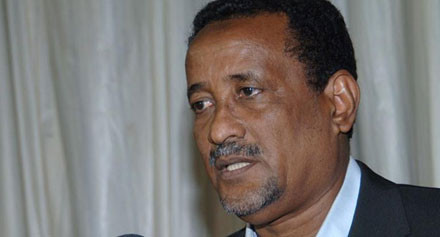Some participants of the National Dialogue in Sudan are annoyed by a visit to the committees by the Presidential Assistant Ibrahim Mahmoud Hamid, seeing it as a sign of government interference in the process of the Dialogue.
Dr. Saad-Eddin Mohammed Al-Tayib, a member of the governance committee within the National Dialogue, told Radio Tamazuj that the presidency official made a ‘surprise’ visit to the committees on Sunday at the headquarters of the National Dialogue committees, saying this created discontent among some members of the committees.
He revealed that there were verbal altercations between the presidential aide and Amin Banani, head of the Justice Party, reportedly over whether a government representative should enter into the affairs of the committees when the ruling party already has delegates on each of the committees.
The dispute which occurred within the Economic and Livelihood Committee prompted an order to remove cameras outside of the committee and instructions not to speak to the media.
Ibrahim Mahmoud Hamid himself is a member of the National Dialogue’s high coordinating committee. State-run news agency SUNA confirmed that the presidential aid “toured the different committees of the national dialogue and got acquainted with progress of their deliberations.”
He is reported to have said that members of the coordinating committee are supposed to attend the Dialogue sessions in order to solve any problems that may arise at the committee level.
Separately, the Chairman of the Commitee for Governance and Implementation of the Dialogue’s Outcomes, Barakat Musa Al Hawati, said that his committee reached common understandings on various topics.
He said the topics included the constitution, the system of government, legislation, the federal system, the fight against corruption, peaceful transfer of power, development of government organs, and the recognition of ethnic, religious and cultural diversity.
Al Hawati told reporters on Sunday that there was a positive sign in the dialogue, adding that the Sudanese alone have the ability to solve their own problems.
The National Dialogue conference kicked off on 10 October in Khartoum amid boycott by several key opposition political parties and leading armed movements. The two main parties participating are the Islamist Popular Congress Party (PCP) and the Islamist National Congress Party.



